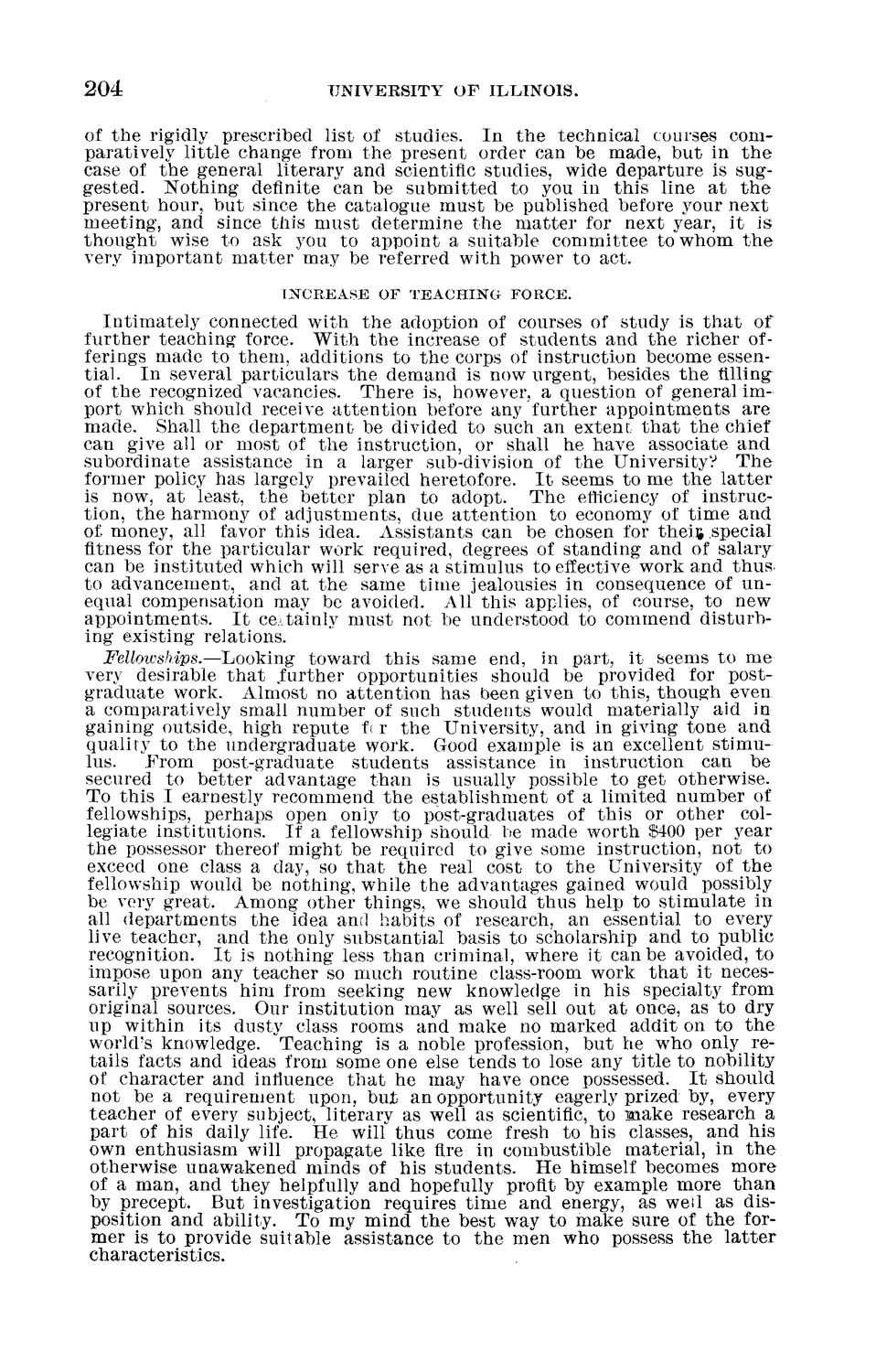| |
| |
Caption: Board of Trustees Minutes - 1892
This is a reduced-resolution page image for fast online browsing.

EXTRACTED TEXT FROM PAGE:
204 UNIVERSITY OF ILLINOIS. of the rigidly prescribed list of studies. In the technical courses comparatively little change from the present order can be made, but in t h e case of the general literary and scientific studies, wide departure is suggested. Nothing definite can be submitted to you in this line at t h e present hour, but since the catalogue must be published before your next meeting, and since this must determine the matter for next year, it is thought wise to ask you to appoint a suitable committee to whom t h e very important matter may be referred with power to act. INCREASE OF TEACHING FORCE. Intimately connected with the adoption of courses of study is t h a t of further teaching force. With the increase of students and the richer offerings made to them, additions to the corps of instruction become essential. In several particulars the demand is now urgent, besides the rilling of the recognized vacancies. There is, however, a question of general import which should receive attention before any further appointments are made. Shall the department be divided to such an extent t h a t the chief can give all or most of the instruction, or shall he have associate and subordinate assistance in a larger sub-division of the University? The former policy has largely prevailed heretofore. I t seems to me the latter is now, at least, the better plan to adopt. The efficiency of instruction, the harmony of adjustments, due attention to economy of time and of money, all favor this idea. Assistants can be chosen for theift special fitness for the particular work required, degrees of standing and of salary can be instituted which will serve as a stimulus to effective work and thus to advancement, and at the same time jealousies in consequence of unequal compensation may be avoided. All this applies, of course, to new appointments. I t certainly must not be understood to commend disturbing existing relations. Fellowships.—Looking toward this same end, in part, it seems to me very desirable t h a t further opportunities should be provided for postgraduate work. Almost no attention has been given to this, though even a comparatively small number of such students would materially aid in gaining outside, high repute f r the University, and in giving tone and < quality to the undergraduate work. Good example is an excellent stimulus. From post-graduate students assistance in instruction can be secured to better advantage than is usually possible to get otherwise. To this I earnestly recommend the establishment of a limited number of fellowships, perhaps open only to post-graduates of this or other collegiate institutions. If a fellowship should be made worth $400 per year the possessor thereof might be required to give some instruction, not to exceed one class a day, so t h a t the real cost to the University of the fellowship would be nothing, while the advantages gained would possibly be very great. Among other things, we should thus help to stimulate in all departments the idea and habits of research, an essential to every live teacher, and the only substantial basis to scholarship and to public recognition. I t is nothing less than criminal, where it can be avoided, to impose upon any teacher so much routine class-room work t h a t it necessarily prevents him from seeking new knowledge in his specialty from original sources. Our institution may as well sell out at once, as to dry up within its dusty class rooms and make no marked addit on to the world's knowledge. Teaching is a noble profession, but he who only retails facts and ideas from some one else tends to lose any title to nobility of character and influence t h a t he may have once possessed. I t should not be a requirement upon, but an opportunity eagerly prized by, every teacher of every subject, literary as well as scientific, to make research a part of his daily life. He will thus come fresh to his classes, and his own enthusiasm will propagate like fire in combustible material, in t h e otherwise unawakened minds of his students. He himself becomes more of a man, and they helpfully and hopefully profit by example more than by precept. But investigation requires time and energy, as well as disposition and ability. To my mind the best way to make sure of the former is to provide suitable assistance to the men who possess the latter characteristics.
| |